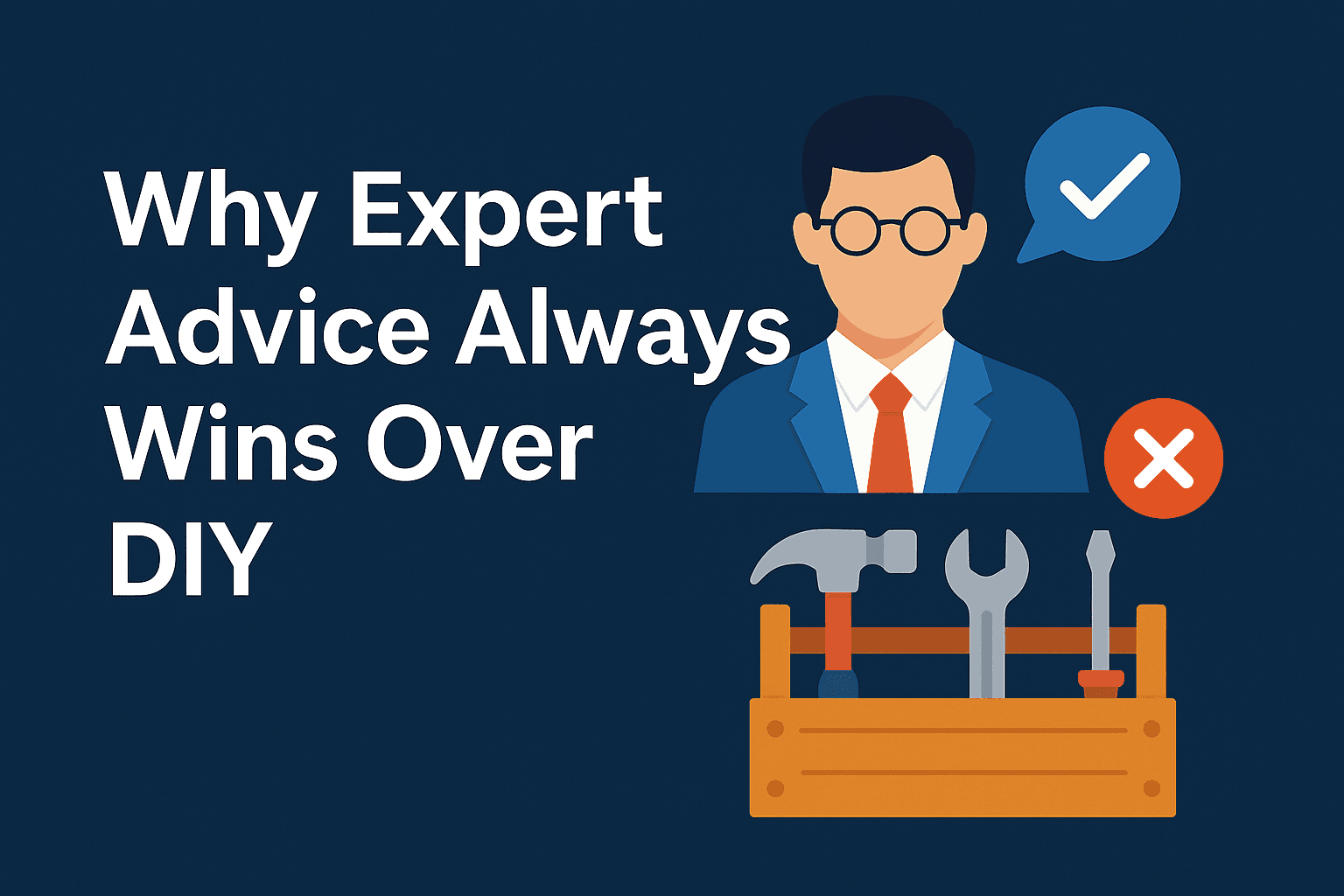
Please wait

Please wait

8/13/2025
In the age of endless online tutorials, social media hacks, and “how-to” guides, it’s tempting to think we can handle anything ourselves. From fixing a leaky pipe to managing investments, the do-it-yourself (DIY) mindset has never been more popular. And to be fair, there’s a certain satisfaction in rolling up your sleeves and solving problems without calling in outside help.
But here’s the uncomfortable truth: when it comes to important, complex, or high-stakes situations, expert advice almost always outshines DIY attempts. Whether you’re navigating a legal contract, planning a financial strategy, making a medical decision, or tackling a large-scale project, the difference between getting it right and getting it almost right can be huge — and often costly.
This blog will explore why expert advice beats DIY every time, backed by real-world reasoning and examples.
DIY relies heavily on self-research. The problem? Information is not the same as expertise.
An expert has spent years — sometimes decades — studying, practicing, and refining their craft. They’ve seen things go wrong, learned from those experiences, and developed an instinct for spotting issues before they become disasters.
Think of it like this: You can watch a hundred videos about flying a plane, but you wouldn’t trust yourself to take off and land without training. The same logic applies to professional fields like law, engineering, medicine, or advanced technology.
Experts bring:
One of the biggest misconceptions about DIY is that it’s cheaper. In reality, doing something wrong and then hiring an expert to fix it often costs more than hiring the expert from the start.
Let’s say you’re renovating your kitchen. You decide to install your own tiles, thinking you’ll save on labor costs. But after a week of work, the tiles start cracking because the foundation wasn’t prepared correctly. Now you have to pay for removal, replacement, and labor — essentially doubling your costs.
Experts streamline the process by:
The most dangerous aspect of DIY isn’t what you get wrong — it’s what you don’t even realize you need to consider. This is known as the “unknown unknowns” problem.
For example:
Experts see the whole picture. They know what questions to ask, what hidden risks to look for, and how to navigate complexities you might not even know exist.
DIY resources — from YouTube tutorials to blog guides — are designed for the general public. They are one-size-fits-all, which often means they’re one-size-fits-none when it comes to unique situations.
Experts, on the other hand, provide tailored advice based on your exact needs, resources, and goals.
For instance:
Personalization is the secret ingredient that turns advice into results.
DIY projects can be exciting at first, but when problems arise, they quickly become stressful. Imagine being halfway through a complex home repair and realizing you’ve made a critical error that could damage your property — or worse, harm someone.
Expert advice provides peace of mind. Knowing that a trained professional is guiding (or executing) the process allows you to focus on your life without constant anxiety about whether you’re making the right choices.
Stress has its own costs — both mental and physical — and avoiding it is often worth the price of professional help.
Every project, investment, or decision carries some risk. The difference is that experts are trained to manage risk effectively. They understand worst-case scenarios, contingency planning, and how to minimize potential damage.
For example:
In contrast, DIYers often underestimate or overlook risks until it’s too late.
An expert can often achieve in days what might take a DIYer weeks or months. Why?
In business, this speed can mean launching a product before competitors. In home projects, it can mean enjoying your new space sooner. In health, it can mean faster recovery.
When you hire an expert, there’s accountability. If something goes wrong, they have professional standards — and sometimes legal obligations — to make it right. With DIY, if you mess up, there’s no one to blame but yourself, and no safety net to fall back on.
This accountability ensures higher quality work from the start.
Experts often have access to specialized tools, networks, and insider knowledge that the average person doesn’t. This could be:
These resources can make a huge difference in the quality and outcome of your project.
Finally, expert advice gives you confidence. You know you’re making informed decisions based on real experience, not guesswork. This confidence leads to better outcomes — and often to faster progress.
DIY has its place. For small, low-risk projects, learning by doing can be rewarding and cost-effective. But for anything complex, high-stakes, or with long-term consequences, expert advice is the smarter, safer, and often cheaper choice in the long run.
An expert’s value isn’t just in what they know — it’s in how they apply that knowledge to your unique situation, saving you time, money, and stress.
So the next time you’re tempted to go the DIY route for something important, ask yourself: Do I want to learn the hard way, or do I want to get it right the first time?

Est exercitation ten

Expert advice saves time, money, and mistakes.

Professional guidance transforms uncertainty into confident action. By offering expertise, objectivity, and tailored strategies, it helps you avoid costly mistakes and move forward faster. From simplifying complex problems to providing emotional support and accountability, the right expert turns confusion into a clear path toward long-term success.